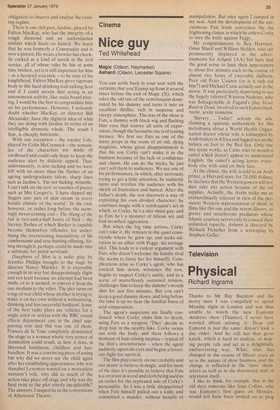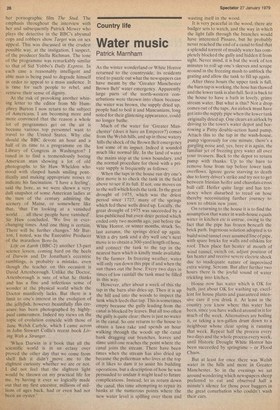Television
Physical
Richard ingrams
Thanks to Mr Ray Buckton and his merry men I was compelled to spend Monday night in London and was thus unable to watch the new Eamonn Andrews show (Thames). I never have worried about missing it. Dear old Eamonn is just the same: doesn't look a day older. And he still has that great knack, which is hard to analyse. of making people talk and act in a delightfully embarrassing way. What. alas. has changed in the course of fifteen years or so is the nature of show business, and the change is reflected in the 'stars' themselves as well as in the downward drift of television itself.
I like to think, for example. that in the old days someone like Joan Collins, who was Eamonn's first guest on Monday. would not have been invited on to plug her pornographic film The Stud. The emphasis throughout the interview with her and subsequently Patrick Mower who plays the detective in the BBC's abysmal cops and robbers show Target was on sex appeal. This was discussed in the crudest possible way. at the instigation. I suspect. of the producer Stella Richman. The tone of the programme was remarkably similar to that of Sid Yobbo's Daily Express. In each case a reasonably intelligent and able man is being paid to degrade himself in order to appeal to a mass audience. It is time for such people to rebel, and retrieve their sense of dignity.
At the risk of provoking another whining letter to the editor from Mr Humphrey Burton I now return to the subject of Americans. I am becoming more and more convinced that the reason a whole lot of programmes get on the air is because various top personnel want to travel to the United States. Why else should the BBC devote an hour and a half of its time to a programme on the Library of Congress in Washington? I tuned in to find a tremendously boring American man showing a lot of old photographs to Sir Huw Wheldon who stood with clasped hands smiling pontifically and making appropriate noises to indicate his fascination. have a feeling', said the bore, as we were shown a very dull snapshot of some American ladies at the turn of the century admiring the scenery of Maine, or somewhere like that, 'that I'm looking at a vanished world ... all these people have vanished'. Sir Huw concluded. 'We live in everchanging times. And one thing is certain. There will be further changes.' Mr Burton, I noted, was the Executive Producer of the marathon Bore-In.
Life on Earth (BBC-2) another 13-part science lesson, coming hard on the heels of Darwin and Dr Jonathan's eccentric ramblings, is probably a mistake, even though the teacher on this occasion is David Attenborough. Unlike the Doctor, Attenborough is sure of what he thinks and has a fine and infectious sense of wonder at the physical world which the Doctor manifestly lacks. But there is a limit to one's interest in the evolution of the jellyfish, however beautifully tills cre ature has been photographed by highlypaid cameramen. Indeed my views on the topic of evolution coincide with those of Jane Welsh Carlyle, which I came across in John Stewart Collis's recent book Living With a Stranger.
'When Darwin in a book that all the scientific world is in an ectasy over proved the other day that we come from shell fish it didn't move me to the slightest curiosity whether we are or not. I did not feel that the slightest light would be thrown on my practical life for me. by having it ever so logically made out that my first ancestor, millions of millions of ages back, had or even had not been an oyster.'







































 Previous page
Previous page